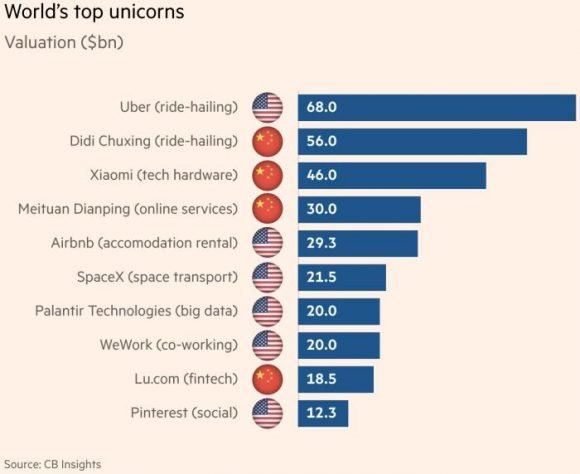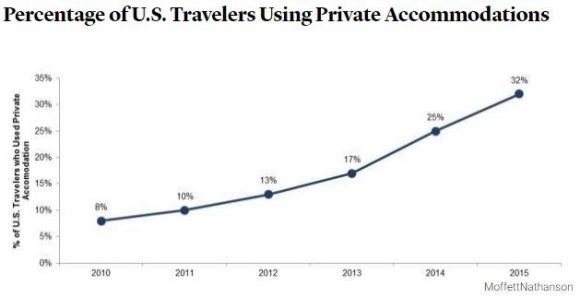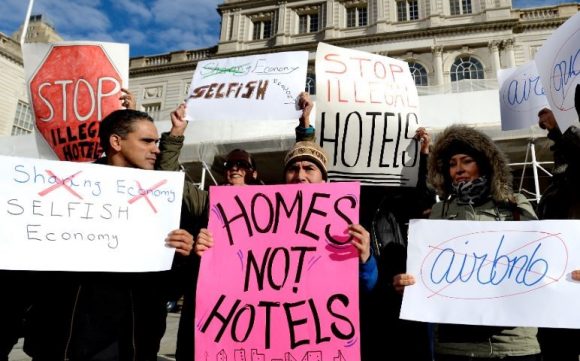Which Unicorn Will Eat Your Lunch?
Hold onto your hats or you might get swept up.
Avoid the projectiles while you're at it.
There are no imminent tsunami warnings. But something else is happening in the world that you might want to know about.
Disruption.
The pace of disruption is accelerating beyond all recognition.
CEOs are here today and gone tomorrow, exiting through the revolving door of companies devoured by disruption.
Are we on the verge of the rise of the robots?
I wouldn't go that far ... yet.
But the truth is that disruption is redefining the world as we know it.
The latest stage of modern disruption came to us by way of smartphone apps.
This application created clear-cut platforms allowing companies to penetrate deep into the smartphone ecosystem where most of the youth are hanging out with consequences galore.
The unfolding of the sharing economy has been nothing short of breathtaking.
Take Uber.
Uber was so disruptive that its former CEO, Travis Kalanick, disrupted himself out of a job at Uber.
That is quite disruptive.
First, look at its business model.
Uber does not actually create intrinsic value.
It does not create something you can eat, sleep on, or imbibe.
Uber is a vanilla app that brings together a marketplace for riders and ride givers effectively becoming a de facto broker.
Brokers have been around since the advent of time.
This type of technology lacks quality, and half the undergraduate computer engineers in university could fabricate something similar with ease.
Disrupters formulate a plan, scavenge for weak points, identify backdoor entrances, then wreak havoc to the guts of the system.
At an auction late last year in 2017, New York City taxi medallions were going for a derisory $186,000, precipitously lower than the $1.3 million in 2014. A spate of taxi driver suicides ensued.
The 86%-plus drop in value is directly correlated to Uber's advancement into the taxi industry.
It's that simple.
Taxi drivers have been left holding the bag and in big-time debt crying their eyeballs out.
Buy low and sell high. I guess taxi drivers didn't get the message.
The initial point of attack was to render the taxi medallion utterly useless.
To find drivers of its own, Uber subcontracted regular people as drivers.
Genius! Another problem solved.
In one fell swoop, the Uber app made every adult with a driver's license a taxi driver anywhere in the world.
Ka-ching!
New York City capped the total amount of medallions in circulation at 13,587.
The flood of new drivers crushed the price of taxi fares around the world bettering the lives of the average Joe.
Uber also figured it would be cheaper to allow drivers to use their own private car, shedding the costs to maintain, finance, and service one of the highest inputs of taxi business models.
Uber and the rest of the tech industry benefit from being the least regulated industry in the world.
The lack of regulation was a golden ticket to test the rules of the road.
That is exactly what unfolded.
Management even approved an app inside the Uber app bent on skirting the challenges of secret strings organized by police enforcement.
The app, called Greyball, reaffirmed the company ethos of pushing regulation to the brink of no return.
Any emerging tech company not pushing the borders of regulation should not be in technology.
Everything reverts back to the fact that emerging tech is held in check by one metric - growth.
Growth solves anything in the eyes of tech investors.
Yes, it's unfair that Walmart and traditional media companies don't get the same free pass, but life is unfair.
Uber had incentive to break all the rules because surpassing growth targets would lure in additional financing.
The outperforming growth is the main logic justifying an investment in a cash-burning enterprise.
People don't like losing money but people with deep pockets will wait it out if they know there is a golden prize at the end of the road.
The administration has grossly failed to regulate technology, even after the Cambridge Analytica scandal came to light.
This all bodes well for technology companies.
Europe is the hotbed for global data regulation. Large tech companies have been astutely planning for the new General Data Protection Regulation (GDPR) rules to take effect.
The companies that do not create anything proprietary are at serious risk of being passed over in the history books.
Therefore, the aggressive tactics "broker apps" adopt are completely justified, and it is paying off in spades as the 2019 IPO approaches.
That upcoming momentous day will enrich many people associated with Uber and in hindsight, management might acknowledge that its initial wild ways were worth the price of the mild rebuke.
The underlying problem is tech disruption, and the success of it has many unintended consequences - particularly social upheaval and job losses.
Myanmar born "Kenny" Chow's body was found floating face down in the river around the Brooklyn Bridge after his family said he disappeared a few days ago.
This was the fifth New York taxi driver suicide in the past five months.
Chow had taken out high-interest loans to pocket his $700,000 New York City medallion and his precarious financial situation, brought upon by the success of Uber, led him to leap to his death.
Sadly, the thirst to grow means taking away other people's livelihood and even their option to live.
We know the pace of change is in full gear. However, the amount of people being economically and socially displaced is a worrying sign that public opinion cannot absorb the accelerating pace of disruption.
More regulation? Probably not.
Chow isn't the first person to lose a job because of technology and won't be the last.
Enter the hotel industry.
Accommodation-sharing app Airbnb was the end for hotels as we knew them.
Airbnb is the Uber of short-term rentals, matching renters with private home owners. They earn revenue by the servicing fee incurred for the brokering.
The harbinger of doom never came to materialize for the hotel industry, which is enjoying record profits - the likes we have never seen before.
The synchronized economic recovery fueled the demand for hotel rooms located in economic hubs close to urban centers.
As we found out, 90% of business travelers have no desire to stay in other people's houses, and the assortment of services hotels offer is critical for the prototypical business traveler.
The hotel industry saved its bacon while Airbnb is thriving. A win-win situation.
You thought wrong.
Airbnb services are a hit with tech-savvy Millennials, which data reveals as upper-middle class, young, and addicted to wanderlust.
The percentage of American travelers using private housing has more than quadrupled since 2010.
The surge in Airbnb users coincides with an explosion of global tourism led by the bourgeoning Chinese middle-class flooding tourist meccas all over the world.
The app that champions individuals to open up their personal homes is effectively pricing out locals from the dwindling supply of available residential housing.
The problem is most acute in Spain and every other tourist haven.
Madrid currently has 9,000 private units rented out to globe-trotting tourists, a sevenfold rise since 2013.
Of these 9,000 units, 2,000 are illegal and do not possess the necessary permits.
In the port city of Valencia, online-based private housing rose more than 30% since 2016.
To cope with the droves of tourists, the local government is attempting to pass legislation by removing 95% of the housing supply from house-sharing applications, in effect giving local residents back their neighborhoods.
Airbnb is another prime example of the severe lack of regulation that tech revels in, which in turn boosts the pace of technological disruption.
Blame the government. Lawless industries breed marginal behavior. We are all just a function of our environment.
Local neighborhoods are being ravaged by these short-term rentals and entire cities are being turned into massive tourist depots with little afterthought of the local people.
Examples are legion. Venice, Italy; Prague, Czech Republic; Dubrovnik, Croatia; Lisbon, Portugal. And the list goes on and on.
These cities are the victims of their own success and are grappling with hordes of tourists ruining the charm and souls of their beloved cities.
Granted, rapid development of the tourist industry trended toward this result, but the pace of upheaval has accelerated beyond anyone's wildest dreams.
For years, taxi drivers were seen as the first cohort to eventually be swept away with the magic of technology, but it happened too fast for people to accept.
I hope your uncle isn't a taxi driver.
Unfortunately, things are about to get a lot worse as the first stage of disruption transitions to the history books and the next stage is upon us.
The second stage will displace even more people as this unregulated industry sees everything as a zero-sum game.
This stage will incorporate higher grade tech - not just a broker app - that will change the world faster and to a larger degree than anything witnessed today.
And the next stage will incorporate proprietary technology the world has never seen before.
Imminent rollout of self-driving cars hitting the market in 2019 to 2020, will be the first progression for investors to digest.
Followed directly after self-driving will be the broad-based adoption of 5G delivering Internet connection speeds more than 100 times faster than current speeds, stoking a new leg up of commercialization.
As for now, Uber and Airbnb, which both plan to go public in 2019, are eye-opening success stories catapulting them into the top five of global unicorns along with the Uber of China (Didi Chuxing), the Apple of China (Xiaomi), and the Grubhub of China (Meituan-Dianping).
And if you somehow descend on Barcelona during this summer's tourist season, you might want to avoid the tourist protests.
_________________________________________________________________________________________________
Quote of the Day
"They counterfeit our goods, steal our intellectual property rights, and hack the computers of our industries and government. Something must be done about it." - said Director of the United States National Economic Council Larry Kudlow when asked about a specific country.






